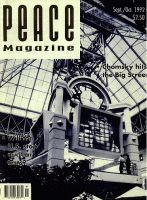
Peace Magazine Sep-Oct 1992, page 26. Some rights reserved.
Search for other articles by PMag staff here
Co-directed and co-produced by Mark Achbar and Peter Wintonick, of Montreal-based Necessary Illusions. Co-produced by tbe National Film Board, 165 min.
They have collected gold, and they have refined it. The gold is in the ideas of Noam Chomsky, the brilliant American linguist and seemingly indefatigable writer-activist.
The first part of the film is entitled, "Thought Control in a Democratic Society," which sounds like a contradiction in terms given all the talk about the free press. Chomsky's thesis is that the mainstream media in the USA operate together pretty well in lock step. They form a giant perceptual filter blocking out effective analysis of how our corporation-controlled socioeconomic system works, and to whose benefit.
It was 25 years ago that Chomsky first became newsworthy, when he was arrested for his part in anti-Vietnam activity. That was the beginning of his persistent attempts, through books and personal appearances, to alert the public to how and why they were being duped and what was denied them.
His politically relevant criticism is unknown to many Americans and Canadians because, although we are overloaded with so-called "information" he and others with dissenting views have been largely excluded from the main-stream media..
Among the few encounters with the mainstream (or "malestream") U.S. media, one with the rightwing William Buckley is shown in the film. Buckley makes faces, rudely interrupts, and rolls his eyes-typical of mainstream approaches to effective radicals.
Some assert that there is little or no difference between Canada and the USA but one difference is that in this country Achbar, Wintonick and Canada's publicly owned National Film Hoard made this film. We get the essential Chomsky, including his skewering of that over-inflated institution of propaganda, The New York Times, his advice about instituting intellectual self- defence; his calls to expanded vision and to activism, his unmasking of the power elites, his fine slicing through the layers of media hypocrisy; his baring of the evils of "our" system in which resources are controlled and exploited by private interests which increasingly do not overlap with the common interests.
People who know his work may find the beginning of the film a little slow but it does the necessary job of setting the scene for those less well acquainted with the reasons for his radical critique of the mainstream U.S. media. The film is lengthy but the producers have wisely allowed for an intermission after Part I, which ends with an account of the deliberate mishandling of news about the bombing, killing and associated horrors in Cambodia and East Timor. You need a breather after that one, as it confirms all your worst suspicions.
This is an important film for Canadians to see because we are greatly influenced by the U.S. media. It will be shown first at festivals in Vancouver, Toronto, Montreal and Halifax this fall and then it will be available to commercial cinemas. Any Canadian can rent a copy of the film or video from the NFB for a nominal charge. Phone the 800 number for your area to place an order:
Atlantic Canada 1-800-561-7104 Quebec 1-800-363-0328
Ontario 1-800-267-7710
Western and Northern Canada 1-800-661-9867
Watch Vision TV for the television premiere of Manufacturing Consent: Part 1: January 22, Part 2 January 29. The CBC Witness series may also show a truncated version of the film.
Americans should order from Necessary Illusions, 10 Pine St West, Montreal, Quebec, H2W 1P9, (514)287-7620).
Review by Barrie Zwicker and Jean Smith. Barrie Zwicker is a Toronto-based publisher and media critic regularly seen on the VISION TV program 'Arts Express "Jean Smith is a peace activist and helper at Peace Magazine.

Peace Magazine Sep-Oct 1992, page 26. Some rights reserved.
Search for other articles by PMag staff here